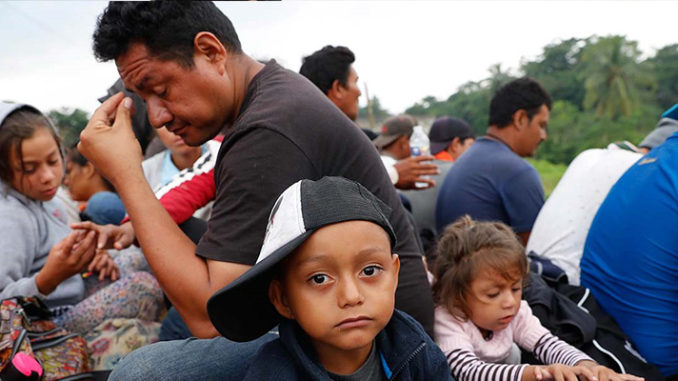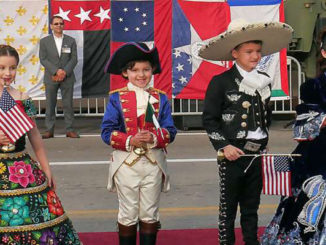
Donald Trump is slowly making the U.S. into a likeness of the countries Latino refugees have been fleeing.
by Luis Alberto Urrea
My father was a Mexican citizen until the day he died. He lived here in the U.S. on a green card. A former military man and federal agent under several Mexican presidents, he remained patriotic and deeply conservative. Though he had been chased out of his beloved Mexico City by the toxic whims of a presidential strongman, he stayed loyal.
He loved Dwight Eisenhower and Richard Nixon. He joked that if he were an American citizen, he would have tried to vote for Nixon twice in 1968. He used to boast that Nixon was the first Latin American–style president America had ever elected. My father was a law-and-order man—once a cop, always a cop. He might have fallen for Donald Trump if he’d lived long enough. But Trump would have talked him out of it in his first televised anti-Mexican rant. At least I think that’s what would have happened.
During 2020’s apocalyptic summer, photographs circulated of immigrant farmworkers toiling in fields amid walls of smoke and fire as California burned around them. The pictures have visceral impact—they are frightening yet beautiful. But their effect on me was epiphanic: Here were perfect metaphors for the harvest of nearly four years of recklessly vicious rhetoric and policies, of Immigration and Customs Enforcement raids and cruel family separations, of toxic propaganda and the relentless boondoggle of the border wall. Here was the theater burning down as the hypnotist kept working the mic, like Jim Jones calling us all into the delirious excitement of sheer nihilism. The Book of Revelation for Suckers.
From the moment Trump descended on his golden escalator, head full of cynical texts of racial threat, the die was cast. For his new idea of a resurgent Great America to take hold, there had to be sacrifices. Human sacrifices. And imaginary hordes of raping “bad hombres” and their chain-migrating families were the perfect targets. He must have had visions of Andrew Jackson churning in his head: A Trail of Tears would have sounded good to him, as long as it didn’t point north.
Some four years later, as the new era that Trump promised struggles to be born, nursed by fire and hurricane, flood and drought, violence and pestilence, falsehoods and greed, I turn to the pictures of those unseen human beings risking their lives and health every day so you and I can have tomatoes and strawberries. I suspect that none of the fieldworkers pictured is secretly hoping to rape, sell drugs, or cheat the American university system into giving them free tuition. But sly old dragons like Trump know there’s money to be made—tsunamis of campaign donations from panicked party faithfuls who have absorbed their leader’s fever dreams; a steady flow of cash to round up and “house” our undocumented guests.
Buckets of money and megawatts of power pour out of the poor if you know how to get your needles and hooks into them.
The huddled masses face violent disdain everywhere. It’s what Jesus alluded to when he said that the poor would always be with us. Tijuana has a robust Trumpian population. These Mexicans don’t want any more new people heading north to them either. Not after the Salvadorans and Hondurans, the Guatemalans and Brazilians, the Nicaraguans and Haitians. Tijuana has thousands of Haitian refugees who fled earthquakes and hurricanes and made it to Brazil, then made their way to our border; always ready to evolve, the city’s street vendors now make Haitian food to go with the carne asada tacos. Tijuana Trumpies have red hats, too. Theirs say make Tijuana great again.
Do you remember the caravans? The terrifying hordes of diseased and criminal “illegals” threatening to cross our trembling border? Caravans were a presidential favorite for a minute, back when he’d go on TV and tell us scary stories at night.
It gets lost among the other crises in the Trump hit parade, such as Pizzagate and Obamagate. And the omnipresent danger of MS-13. And cancer from wind turbines. And very fine people on both sides. And that darned China virus that would, despite its nefarious origins, magically disappear so the administration wouldn’t have to deal with it. Remember?
The caravans were so terrible that our country had no choice—we had to tear apart families seeking sanctuary and stick them in secretive ICE camps where children were lost, perhaps forever, from their parents. Several of the secretive camps are private prisons, by the way, where thunder lizards with ties to the current administration can make a few tons of federal dollars off the backs of the little brown beneficiaries of our care. Some of these children were “placed” in the homes of Americans, and adopted by these families after their parents were deported.
South American right-wing governments, it’s perhaps worth noting, also have a history of confiscating very young children and doling them out to fellow travelers. During Argentina’s Dirty War, in the late 1970s and early ’80s, the disappeared were collected by men driving unmarked vehicles. It was later revealed that military officers had given the children of these removed citizens to childless couples, as rewards and loving gestures of the junta. Mothers protested in the squares of Buenos Aires; they still do today. All these years later, some of those parents are still separated from their children. How many of the children separated from their families at the American border will never see their parents again? And who is even keeping track?
Many people I talked with during the caravan panic were under the impression that these invaders were all Mexicans, but in fact, most of those who fled north were Central Americans. They knew this much: The United States traditionally offered sanctuary to migrants seeking refuge from violence and oppression. The Statue of Liberty, not Trump Tower, is the symbol of the United States. She smiles upon the world like the mother of God herself to those facing extermination or starvation. Ironically, many of the refugees were fleeing the gangs that the president claimed they belonged to.
Mexico, like the U.S., was torn—the government and much of the populace didn’t want strangers invading their country. Echoing Trump, they portrayed the new arrivals as vermin, scuttling north. The migrants, for their part, had no organized leadership. These were ad hoc groups that fled on short notice, making plans each night as they went. Most of them walked hundreds of miles. Then hundreds of miles more. And some of them hopped on the death train.
You may have heard of “La Bestia.” This freight train wends its way up through Mexico to the borderlands. Its sides and roof are the conveyance of the desperate—people who brave gangs and narcos and federales and soldiers and the elements and fear and hunger and accidental dismemberment. People who could not walk all those miles.
In response to the migrant crisis, the railroad accelerated the train. It was already dangerous; the increased speed made it more deadly. The number of traumatic amputations for travelers who fell beneath the wheels increased. (The Mexican Red Cross now transfers some of the maimed to a pastor who runs a migrant shelter in the state of Guanajuato; he deals with the medical care and prosthetics there.) This train acceleration is a pure act of violent repression.
But a detail that astounds me more is the introduction of so-called security posts along the rail lines. They were installed at various points along the route some years ago. The posts are built close to the rails, to offer only narrow clearance as the train speeds through. And the hangers-on who have clambered aboard risk being efficaciously smashed off and scattered into the desert night. The lucky ones find shelter and wait for artificial legs.
How do Mexicans protest? With humanitarian demonstrations, or law-and-order demonstrations? It is harder to offer human aid in Mexico than harsh cruelty. The government looks down on any extension of charity to migrants. Still, along the way, in many of the towns where the train stops, local people of little means gather along the tracks with tortillas and bread and fruit and water. American expats sometimes join them.
Some of the unwounded make it all the way to the border, where they are denied entry by the U.S. and pushed into Tijuana to live in COVID-breeding dumps—they can’t go home, or they will be killed. They can’t go forward, because they know what awaits their babies.
This is all in response to our administration’s actions and rhetoric. As are the Tijuana MAGA hats—MTGA, I suppose.
Meanwhile, the glorious Klondike of graft known as the border wall stumbles along, creating tens of miles of multimillion-dollar yard art. In the past few months, ICE and Border Patrol agents have been redeployed as Trump’s secret police, the shock troops sent to protests in American cities, driving unmarked vehicles to collect dissidents. Either the current government of the United States does not care about the “waves” of people invading the country, or the border may not be under siege after all.
Still, it is worth looking south as the U.S. presidential election nears—to those brown lands that have law-and-order forces even more ironfisted than our president dares to be. Yet.
The thunder lizards of any shithole country Trump has insulted have an equal lust for lucre and power. They too look south to conjure “others”—why do they always look south, at poorer, more tattered countries than their own? But they also look within, persecuting “others” in their own lands, even those who look just like them but are insufficiently subservient or merely inconvenient. Like we are starting to do with the antifa kids. Or with the Black Lives Matter protesters, those mothers who need to be pepper-sprayed for standing on the street.
Before he left Mexico, my father faced a crisis of political faith, and this led to his exile from Mexico’s power machine. He was given an order he could not, in good conscience, carry out. But he was still a conservative. He still believed in order. The San Diego suburbs where we finally landed made him comfortable and ruined him. He was now just a bowling-alley custodian, not a power broker with a black car and a Harley and a long military coat. He became the dad of a Bob Dylan fan. And he had to watch, in 1968, on our new color TV, how his beloved government massacred kids like me in Tlatelolco for protesting during the Olympics and embarrassing the mighty men in the presidential palace. He could no longer take refuge in the belief that the system was righteous, despite those leaders who strayed. He saw American conservatism as a last bastion of hope. But he would have finally lost that hope under Trump. He would have recognized the darkness too well.
Do you see where I think this is all going? When you monetize power, when your politics no longer have room for empathy, things spin into an amoral chaos. Not only the desperate suffer. Who gets hurt and who stays safe becomes hard to predict.
In 1977, my father went back to Mexico to fetch his life savings as a graduation gift to me. Driving home, he died in a single-car accident that was never fully explained. When I tried to claim his corpse at the border, I was told he was still in custody and I would need to first pay his bail. His life savings, literally blood money, was still wet when I handed it over—all of it—so I could bring my father home.
Today, I find myself on that loading dock again with my father’s corpse and those men. I hear them tell me, “It’s just business, mijo. It’s the way things work.” And I fear that it is true.
Luis Alberto Urrea is the author of 17 books including The Devil’s Highway and The House of Broken Angels.



